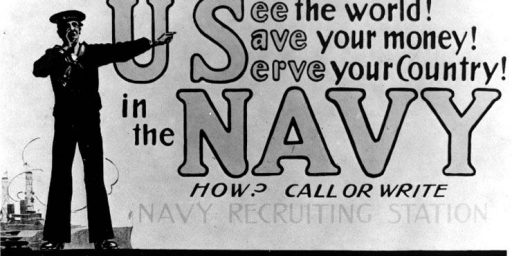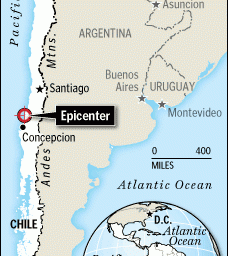Soft Power and the Response to the Haitian Earthquake
Galrahn of Information Dissemination has an outstanding post on the U. S. response to the earthquake in Haiti that deserves your attention. He asks some very interesting and potentially embarrassing questions:
- How long will it take the Naval Expeditionary Combat Command to open up the port in Port-au-Prince?
- How effective will the helicopter operations of the USS Carl Vinson (CVN 70) be in meeting the demands of this crisis? Will the decision by the US Navy not to build a medium lift helicopter carry significant consequences regarding the capacity for the US Navy to respond to this disaster?
- Has SOUTHCOM responded sufficiently with US assets, specifically assets carried forward by the MSC related to supporting over the shore logistics? Will SOUTHCOM insure enough pipelines are available from sea to sufficiently meet the quantity of aid that will be required to support a humanitarian operation of 3 million people in a timely manner?
- Can only three amphibious ships provide enough capability to support the over the shore logistics requirements for a large city without a functioning sea port? How influential would the capabilities of the proposed, but rumored to be canceled in FY2011 budget, Sea Basing concept be to this operation?
- How proactive is SOUTHCOM being in preparing follow on assets that may be necessary before full awareness is determined regarding the requirements? Are we accurately predicting events before they unfold, controlling the chaos as necessary as we place assets?
- Why is China kicking the State Department’s ass in strategic communication in Haiti?
There’s lots more. He also points out the possiblel political hazards of the situation for the Obama Administration:
Things are going to get a lot worse in Haiti before they get better, and that was never clearly articulated by the President, State Department, SOUTHCOM, or Rajiv Shah to the American people, who may begin to doubt our governments efforts in the very near future. President Obama is positioned to take a political hit for what happens over the next 48-72 hours for apparently having advisors who are treating Haiti as anything but the most important event of his political career to date.
In my opinion, and I will let time determine the accuracy, so far it is my impression the Obama administration appears to be completely unaware of how much trouble Haiti can bring upon his Presidency. I’ll bet a Heineken keg that if the President attends a Martin Luther King event Monday instead of focus on what is going to be a political public relations nightmare unfolding in Haiti on television, it will cost the President 5 points in his approval ratings and he will be dogged by claims from his own political party that he is as distracted with Haiti as Bush was during Katrina.
President Obama has made the right noises so far but so did President Bush in the aftermath of Hurricane Katrina. It’s what happens that matters and not necessarily the statements made at the outset.






I have to admit when I first read this piece it pissed me off, which was surprising to me since I normally like Dave Schuler.
The quotes given can easily be taken as a critical tone of the current response which seems to me to be absolutely ludicrous. Reading the source article, it is much more analytical and speculative than oresented here. I am struck by the original authors seeming arrogance that he knows better what is going on and what the response should be than the people that have done this before and have trained for it, but he definitely raises good points.
In a better world, people would also be much more concerned about the actual efforts to help people than the political points that can be potentially scored. There are Americans on the ground in Haiti, who cares if they have raised a flag or not.
One other thing, the last cite above that backhandedly compares Bush/Katrina to Obama/Haiti, even speculatively, is ugly rude and stupid. I missed it in the source article, but saw it here and I can only say I have no words.
Amen. Since when is the government of the United States, under any administration, to be held to the same level of expectation when coming to the aid of a failed state in which 3 million people are affected and over 50,000 are dead to coming to the aid of a city within the United States in which a viable response system and infrastructure were in place? Ye gods.
The real question: why is the US is basically taking on a nation building project in Haiti?
Sure the humanitarian situation is miserable, but why does everyone expect the US to save the day? This is going to take a lot of money and resources away from serious problems here at home.
They be talking about reconstructing Haiti when we shoulds be talking about reconstructing AMERICA.
Haiti signed a pact with the Devil ages ago and now they is reaping what they sow.
We need America for America. Not America for Haiti.
Dave,
Thank you for your kind words sir. A few responses.
C-Red – I appreciate your feedback. I had several active and retired General and Flag officers assist in developing the content and context of that post. There are many concerns inside the DoD.
Mr. Prosser – I agree completely with your opinion, but note people in the US citizenship can be fickle on good days. It would not be the first time we let our emotions get ahead of the facts, should we see the President take political hits.
Triumph – There is a legitimate national security risk assessment you may not be aware of. Every year, usually beginning in February, thousands and in the past tens of thousands of Haitians have taken to the sea to migrate to the US. One of the best funded programs in the Coast Guard specifically deals with this problem. It is why a Cutter arrived in PaP within hours, they were already there for those purposes (and drugs).
If they choose to leave when they have families and homes, what happens when they do not have families and homes to leave behind?
What is the impact of 10,000 illiterate Haitians immigrating to America right now? What about 100,000? What about more? How will this significantly skew the costs of Health Care under debate in the Senate.
If you do not believe this has potential to directly impact your wallet or country to a degree equal or greater than random terrorism from Middle Eastern non-state actors, you have not sufficiently been informed or individually researched the problem. It would not be in our interest to allow a failed state to occur a few hundred miles from Florida.
This is ignoring the greater strategic consequences of failing to live up to our role in the Western Hemisphere, a global region we have neglected and abused relationships with too much since WWII.
Remember, most countries, like Somalia, originally became a failed state because of a natural disaster and the absence of an international response. In history, large scale natural disasters are often cited as the primary factor in changing the relationships between countries within a region. These are important lessons of the big picture to keep in mind, as examples like Darfur in the 90s is an example of a potential outcome for Haiti from a passive response.
I very much appreciate the feedback in these comments.
C-Rod, it’s my understanding that the White House staff is making the comparison to Katrina. Example:
LINK
If this is indeed the type of expectation-raising communications coming from the White House, the President is being ill-served.
Thank you for the clarification and in that case I definitely apologize for the arrogant remark. I hope you will take the “analytical” and “raises good points” as the compliments they are meant to be.
PD Shaw – I would consider a white house reference to the Katrina equally, if not more so, disgusting, but I do not see one in the article. I only see Katrina mentioned in the text of the article and in the quotes of the professor mentioned in the article. Your quote seems to be a speculative lead by the author of the article.
I know comparisons are inevitable, but I still believe and will continue to believe comparing tragedies is nothing but crass.
C-Red & Galrahn. I am only upset about the comparisons, not the questions to the response. This will be a huge undertaking and I hope will be proof of US competence. The immediate humanitarian needs can be met and they will be. Frankly, the security concerns did not occur to me until Galrahn pointed them out. With the 22nd MEU and the 82nd on the ground what is our risk of serious consequences controlling riots and gang looting? What is the response of other countries for civil law enforcement, if any? What kind of blockade strategy can control massive emigration? What should be the long-range goals and the strategy to establish civil stability?
Its a stupid premise. There is a vast difference between a Presidents obligation to provide aid to a U.S. city that has suffered a disaster as opposed to another country.
We need to do everything possible for Haiti, but the two situations are dissimilar on a number of levels.